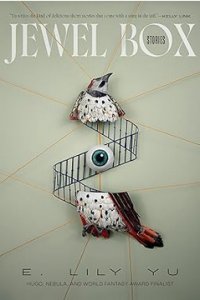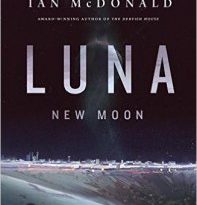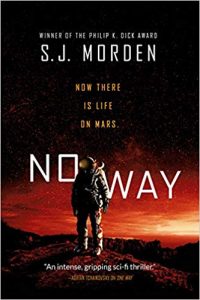Paul Di Filippo Reviews Jewel Box: Stories by E. Lily Yu
 Jewel Box: Stories, E. Lily Yu (Erewhon 978-1645660484, hardcover, 336pp, $27.00) October 2023
Jewel Box: Stories, E. Lily Yu (Erewhon 978-1645660484, hardcover, 336pp, $27.00) October 2023
Recently I had the good fortune to acquaint myself for the first time with a classic of fabulism: Japanese Fairy Tales, by Yei Theodora Ozaki. Witty, elegant, timeless yet timely, these stories aim straight at the human heart, mind and soul, and lodge therein like arrows variously tipped with balm and bane. And now, encountering E. Lily Yu’s debut story collection (the items range from 2011 to the present, since several—according to ISFDB—appear here as originals), I am put into a similar worshipful and ecstatic frame of mind. These fabulaic heterogenous and ingenious mini-masterpieces (including some hard-edged SF) bring to mind such past masters as Le Guin and George MacDonald; Zoran Živković and Karin Tidbeck; Jeff VanderMeer and Kelly Link. And yet out of the cloud of these possible influences and mentors emerges an utterly unique voice—poetical yet clear-eyed, hard-nosed yet romantic. I think that after ingesting this fine book, I would recognize a new Yu story, stripped of its byline, out of any similar lineup. Startling, often surreal novums, fascinating characters, sharply wrought prose.
I’ll try to elucidate Yu’s virtues by a swift pass at all the nearly two-dozen tales herein.
In “The Pilgrim and the Angel”, Mr. Fareed Halawani, simple Muslim businessman in the Middle East, is visited by an impetuous and bossy angel who whisks him off, willy-nilly, to Saudi Arabia. But such glories are not to Mr. Halawani’s liking. What he really craves is a reunion with his immigrant son in Florida. Yu’s skill for droll comedy emerges here.
Stories told from the viewpoint of an “inanimate” object are a classic sub-genre. But you have probably never encountered a roadside street lamp narrating its unrequited love for a handsome human man before you came to “The Lamp at the Turning”. Evoking real pathos from such a situation takes chops, and Yu has them.
Maybe Italo Calvino might have come up with “The Cartographer Wasps and the Anarchist Bees”. Told mainly from the POV of the insects—militaristic geo-minded wasps versus pacifist bees—the story also expertly brings in humans as a macro foil to micro shenanigans.
“The Lion God and the Two Gates” uses the exotic setting of ancient Assyria to examine how by-the-book probity can look like wisdom, but often turns out to be stifling and unfair. A jump to the afterlife completes the scenario.
Here comes one of Yu’s SF offerings. “Music for the Underworld” is a cyberpunk retelling of the Orpheus and Eurydice myth, with some sharp AI variations.
More SF, in a mildly Moderan vein, follows with “Green Glass: A Love Story”. “As they descended to the hundredth level, where programmable plexiglass bubbles waited on their steel cables, Clarissa and Richard quietly congratulated each other on their expensive but toxin-free method of transport.”
It’s accurate to say that Yu favors heroines over heroes, without didactic overlays, and surely one of the best is Ilse, in “Ilse, Who Saw Clearly”. A travelling peddler sells Ilse’s fellow villagers new eyes (which prove defective) and she embarks on an odyssey to restore their vision.
In post-collapse revivified Kenya, poor Jacob—in “The Doing and Undoing of Jacob E. Mwangi”—must contend with the expectations of his relatives and friends. Should he become a Doer, or remain forever on the dole?
A ragtag bunch of alien refugees arrive on Earth in “The Wretched and the Beautiful”. Accommodations are grudgingly made for their welfare. And then come the beautiful alien pursuers who demand punishment for these outlaws. Will beauty trump pity? Yu’s view of human nature is all too plausible.
On a slower-than-light interstellar voyage—”The Urashima Effect”—Leo Aoki experiences a pre-programmed awakening from hibernation. But when he catches up with messages from earth, all the solid foundations of his expedition are undermined. Faced with a dichotomous choice, he has to weigh his personal welfare against humanity’s destiny.
“Braid of Days and Wake of Nights” delivers a Peter-Beagle-esque unicorn hunt in Central Park—all revolving around the love of one woman for her dying friend.
Lucius Shepard would have liked “Local Stop on the Floating Train”, wherein we watch a young woman named Lela as she undergoes a false accusation that finds her suffering a fate worse than death—except maybe it’s not. Yu’s reveling in ambiguity comes to the fore here.
Two dragon-hunting companions are to be found in “The Witch of Orion Waste and the Boy Knight”. But an inequality of societal stature, as well as interpersonal misunderstandings, threaten the painful failure of the partnership.
“In its latter days, the two blessed suns of the planet of Ys grew twice as large and dully red. There was no true day or night on Ys, but a long thin dusk when both suns burned, followed by a dim and feverish evening when one or the other had set.” And with this Vancian opener we are launched into “The Eve of the Planet of Ys”.
Totally mimetic, “Courtship Displays of the American Birder” is a charming rom-com set amidst the bird-watching set. And what a well-deserved happy ending!
An orphan child grows a unique and beautiful flower, but is abused and robbed in “The No-One Girl and the Flower of the Farther Shore.” But these indignities lead her to a startling transcendence.
Formalistically innovative, “The Time Invariance of Snow” is SF that riffs on the Snow Queen fairytale, but with more physics.
The Emperor’s New Clothes saga gets some wild workovers in “Three Variations on a Theme of Imperial Attire”. Any resemblance to a certain ex-President of the USA are, I am sure, entirely coincidental.
Puss in Boots meets the Pied Piper of Hamelin in “The Cat’s Tale”. Various heroic feats lead to a lovely conclusion, which I think is no spoiler to reveal: “As I rode down the ribboning road, all the world before me, rich and strange, I thought I heard, from the hill behind me, the sound of fairy fiddles and bells and pipes.”
Deadly royal intrigues fill the pages of “The Valley of Wounded Deer”. But victory for the noble “prince” (who’s a woman) is not the traditional attainment of the throne.
A woman obsessed with staircases—”The View from the Top of the Stair”—seems a somewhat silly premise at first. But Yu manages to elevate it to transcendental dimensions in true Phantastes fashion.
Choosing “Small Monsters” as the closer was the wisest decision possible. This knockout biography of a—well, a small monster stands in relation to some hypothetical Pixar version as Leonora Carrington stands to Thomas Kinkade. Yu “humanizes” her cast of exclusively non-human sentient creatures while still retaining their oddities and bestial quirks. An artist who is a hermit crab takes various cutesy Disney tropes and warps them like silly putty.
This must-have collection, monumental yet never overwrought, shows Yu sharing the same stage as Salman Rushdie and other fine fabulists of our lucky era.
 While you are here, please take a moment to support Locus with a one-time or recurring donation. We rely on reader donations to keep the magazine and site going, and would like to keep the site paywall free, but WE NEED YOUR FINANCIAL SUPPORT to continue quality coverage of the science fiction and fantasy field.
While you are here, please take a moment to support Locus with a one-time or recurring donation. We rely on reader donations to keep the magazine and site going, and would like to keep the site paywall free, but WE NEED YOUR FINANCIAL SUPPORT to continue quality coverage of the science fiction and fantasy field.
©Locus Magazine. Copyrighted material may not be republished without permission of LSFF.







